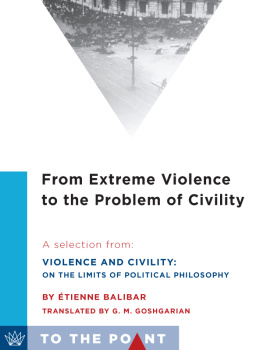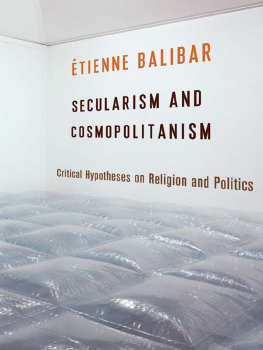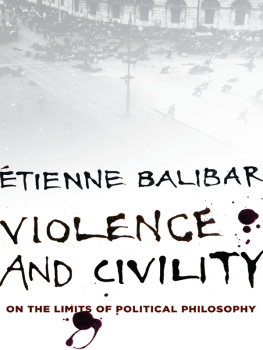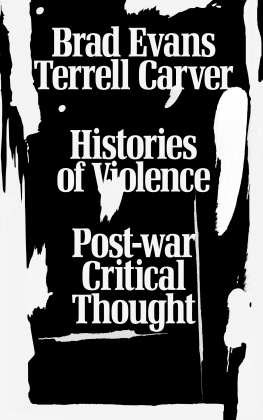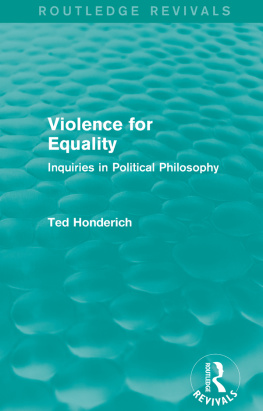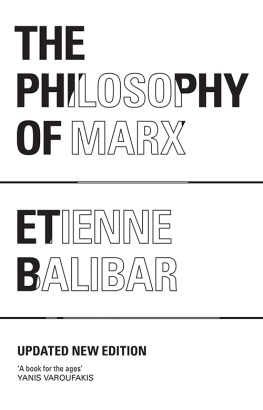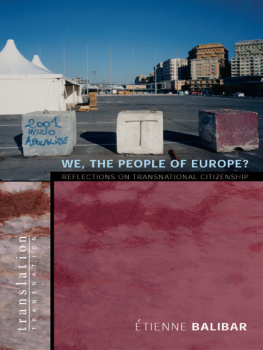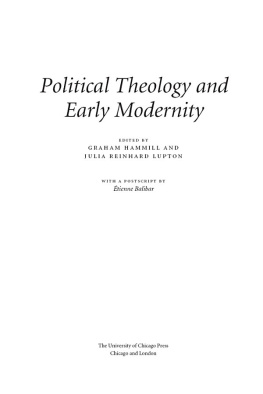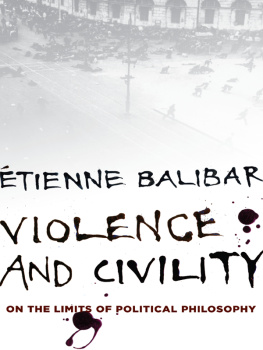From Extreme Violence to the Problem of Civility
A Selection from Violence and Civility: On the Limits of Political Philosophy
tienne Balibar
Translated by G. M. Goshgarian

Columbia University Press
New York
Columbia University Press
Publishers Since 1893
New YorkChichester, West Sussex
cup.columbia.edu
Copyright 2015 Columbia University Press
All rights reserved
Cover design by Noah Arlow after an original design by Chang Jae Lee. Cover image Adhoc-Photos/Corbis.
References to websites (URLs) were accurate at the time of writing. Neither the author nor Columbia University Press is responsible for URLs that may have expired or changed since the manuscript was prepared.
Contents
Violence and Politics: Questions
Non-violence is, in a sense, the worst kind of violence.
Jacques Derrida, Violence and Metaphysics
In one sense, nonviolence is indeed the worst form of violence. But in one sense only, and the whole question lies there, at least under certain circumstances that force us to think about it. That is what I wanted to do, by way of a contribution to this conference, in the form of an attempt to account for the political ambiguousness of the figures of violence and, symmetrically, the ambiguousness of politics when it is confronted with violence.
I might as well admit right away, therefore, that the whole of this contribution will be placed under the sign of an aporia from which I do not think I can extricate myself. My justification is that I do not believe I am alone, and that I am doing my best to respond in this way to emergencies whose injunction we all feel. About violence in its individual and collective forms (one of the insistent questions before us is precisely whether that distinction can be maintained), its old (perhaps even archaic) or new (not just modern but also postmodern) forms, we should surely be able to say something other than that it is unbearable and we are against itor again, in Thomas Hobbess famous formula about the state of nature, taken up by Immanuel Kant, that we must leave it. But it must be frankly admitted that we do not know, or no longer believe we know, how to leave it. And we sometimes find ourselves suspecting that, by a new ruse of history less favorable than the old one, this inability of ours is becoming a condition and form of the reproduction and extension of violence. War or racism, aggression or repression, domination or insecurity, sudden explosion or latent threat, violence and all the different kinds of violence may today be, at least in part, precisely the consequence of this nonknowledge.
Such is the first aporia or quandary. It is quite sufficient to destabilize our understanding of politics and our confidence in its powers, for the presumption that violence can be eliminated is a constitutive element of our idea of politics. Or, if you prefer, it is constitutive of our idea that politics can be instituted. This can be put still another way: on the horizon of politics, as a condition of possibility and a telos of all its practices, is the political [du politique]. In the absence of a pure and simple elimination of violence, we sometime fall back on the idea of a limitation of its field and effects, notably in the twofold form of its confinement to the sphere of the a-social and illegal, which we suppose to be extrapolitical (Michel Foucault challenges this way of representing things), and also in the form of an interruption of the endless spiral of acts of violence (the figures of the talion and vendetta). The idea of a political limitation of violence, however, already contains the essence of the idea that it can be eliminated since it contains the idea that violence is restricted, known, and under control. Politics, insofar as it thus presupposes and presumes the political (the autonomous order of the political), is, to begin with, the negation or sublation of violence. If, however, violence cannot be sublated, or, still worse, if the means and forms of sublating it appear not contingently but essentially as the means and forms of pursuing itif there exists, consequently, an intrinsic perversity of the politicalthen politics becomes desperate and a cause for despair. And we know, or think we do, where despairing of politics can lead.
Closely bound up with this first quandary is a second. Politics would not present itself as a sublation if violence as we usually conceive it were not at once collectivizing and distributiveif we did not proceed, in other words, by first lumping together all forms of violence, however heterogeneous, in a single category in order to then redistribute them in accordance with hierarchies and distinctions whose effect is to exacerbate or minimize them, identify them as tolerable or intolerable, and so on. Yet this unifying-distributive figure of violence, which is on the order of an anticipation of its negation, breaks down as soon as we are confronted with the equivocality, dissemination, and ambiguousness of the forms of violence.
Equivocality because we cannot divide violence up between the public and private spheres without leaving a remainder. If violence consists in crossing limits, if the general formula for violence is the boundariesor barriers, protections, prohibitions, limits of the self, and so onhave been violated, then we cannot assign violence to a definite sphere with any precision. Yet identity, both individual and collective, depends on the existence of such spheres. Equivocality, again, because we cannot clearly assign individuals and groups, once and for all, to the categories of those who suffer and those who perpetrate violence. To all appearances, it is mainly those who suffer it who are also likely to perpetrate it: here, too, boundariesif only intellectual and moral boundariesare crossed once we can no longer content ourselves with calling this an unfortunate consequence, due to the pressure of circumstances or human frailty. As for the fact that those who perpetrate violence sooner or later end up suffering it, it is less often the case; but it makes it easier to see the effect of immanent justice.
Dissemination of violence because, like the weapons of mass destruction the official monopoly on which engenders irresistible calls for their universal redistribution, owing to errors of calculation or apparently chance accidents (this is, indeed, one of the clearest links between violence and institution), the simple act of drawing a borderline to control or reduce violence seems to have the immediate effect of perpetuating if not exacerbating it.
Ambiguousness, finally, not so much because of the often-posed question of the complicity between victim and perpetrator, or the originary uncertainty of the interrelationship between activity and passivity, but because we are unable to assign all the phenomena of nonviolence and violence once and for all to the poles of positivity and negativity.
It will be objected that these have always been the characteristics of violence and, in that sense, that it gets us no further to recall them here. But it might also be supposed not that they are new but that there are conjunctures in which they abruptly become more palpable because they are no longer held in reserve or relegated to some margin of philosophy but are rather, in some sort, exhibited at every turn of daily life and normality. Thus it would seemI shall come back to this in my conclusionthat the picture of the conditions of violence yields to that of a condition of violence that, to repeat, we do not know how to leave (not even by way ofor, doubtless, especially not by way ofasceticism or the contemplation of this world or this history).

